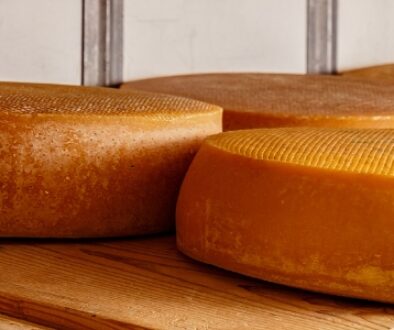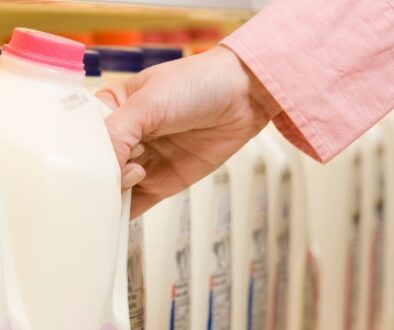Defending the Good Name of Milk
“An almond doesn’t lactate, I will confess.”
Sometimes, the simplest, most obvious declarations here in Washington also are the most impactful. With this statement, U.S. Food and Drug Administration (FDA) Commissioner Scott Gottlieb announced at a policy conference on July 17 that his agency is finally moving toward enforcing its standard of identity for “milk.” This has set off panic among the deep-pocketed marketers of the many plant-based products exploiting that term — including nut beverages — that aren’t (spoiler alert) actually made of milk.
Dr. Gottlieb’s acknowledgment that FDA has for years largely ignored enforcement of its own standards was a welcome development to us, and to all companies dedicated to manufacturing and marketing real dairy products. Even more important than Dr. Gottlieb’s recognition that fake food marketers are abusing his agency’s regulations is the commissioner’s indication the FDA is finally going to take a prescribed course of action to regulate the use of dairy terms on decidedly non-dairy products.
This comes after an intensive effort by NMPF over the past two years to force this issue to the fore within FDA. In the absence of a strong hand — or really, much of any regulation at all — we’ve witnessed a proliferation of plant powders and nut slurries mimicking real milk in a transparent attempt to bask in milk’s healthy halo.
Decades ago, when the primary offender was products marketed as soy “milk,” NMPF warned FDA that if it didn’t circumscribe the use of that term as defined by its existing standards, we’d see a mushrooming of other products also co-opting the word — along with other popular and legally defined dairy terms such as yogurt, cheese, ice cream and butter. And sure enough, as regulators looked the other way, the field has expanded past soy (which is actually decreasing in sales) to things like almonds, quinoa, hemp, potatoes and bananas.
Indeed, this is much more than just a concern regarding fluid milk. The fake food crowd is increasingly trying to peddle products mimicking cheese and yogurt made from the same substrates as the fluid milk imitators, but again containing no real dairy ingredients.
If you thought butter was off limits because there is a clear standard of identity for butter (one actually codified in federal law, not just regulation) and another standard of identity for plant-based substitutes — known as margarine — think again. With sales of real butter increasing and margarine sales tanking, it doesn’t take a marketing genius to figure out where this is headed. Yep, butter substitutes that meet the existing standard of identity of margarine (or even the lesser standard of a product called “vegetable oil spread”) are starting to be re-branded as “vegan butter.” This development alone demonstrates the crass commercialism at play here by the fake food marketers. Their fight to keep stealing dairy’s good name is about nothing more than building market share in any way possible.
As encouraged as we are about Dr. Gottlieb’s proclamations that “we do have a standard of identity [for milk]” and “I do intend to enforce that,” we also have to be prepared that the regulatory course will take time and require a committed dairy community of farmers, processors and others to achieve a satisfactory outcome.
We know that an army of vegans and animal rights activists, working in concert with the marketers of these imitation products, oppose any effort by FDA to enforce the clear and unequivocal dairy standards. The agency will likely solicit public comments to build a legal case for why the existing dairy label standards should finally be consistently applied. It’s sad that regulators should need additional data to support an action that seems obvious and necessary, but that is the reality of the process.
Toward that end, NMPF will work with our members and other like-minded defenders of dairy’s good name to urge FDA to change course. We all need to impress upon the agency how important it is that the current dairy standards of identity are enforced and followed in the future. On July 26, we testified as part of FDA’s effort to modernize food standards, but more voices are needed.
What does the end game look like?
It certainly won’t result in a major hardship for the marketers of the plant-based copycats, as the required labeling changes will be similar to what’s required elsewhere in the world.
Many of the most popular brands of plant-based beverages are also sold in Canada, the United Kingdom and the European Union, in packages that are very similar to those sold here. The only difference is that these brands actually follow the rules against using “milk” as a product term. The United States — although it has the same standards — hasn’t enforced them, which created this Wild West environment of products displaying food names they don’t actually contain.
As we’ve repeatedly told FDA, the reason that this issue matters is that nutrition matters. The term “milk,” regardless of the product using it, conveys that the substance inside the carton is healthy and nutritious.
Real milk always has the same nutritional content, with the only variation being the fat content a consumer decides to choose. Milk is the No. 1 source of nine essential vitamins and minerals in children’s diets, but the imitators lack any consistent profile. Their nutritional content is all over the map, and none deliver the same beneficial nutrients as real milk in each and every glass. That’s why resolving this dispute is a consumer health imperative requiring FDA’s engagement, and not just a squabble between the dairy community and the upstarts wanting to ride on our coattails. FDA has even acknowledged this, announcing on July 26 that it intends to review its standards of identity in relation to potential public health consequences.
While these fake foods have every right to be in the marketplace, they don’t have the right to call themselves something they are not — especially not a food with an existing standard of identity. At the very least, removing the dairy-specific terms from their labels will hopefully help consumers realize that not all “milks” are created equal.
Source: CheeseMarketNews.com




